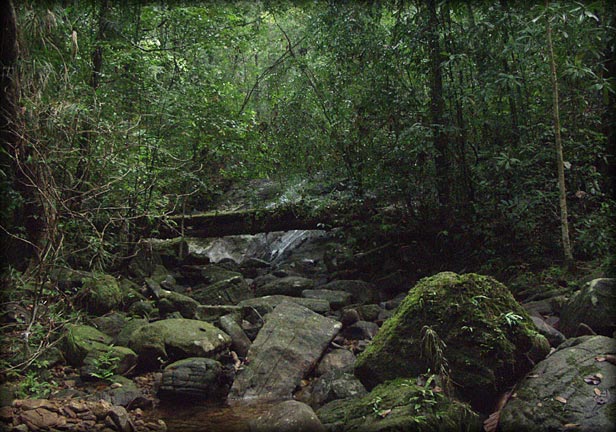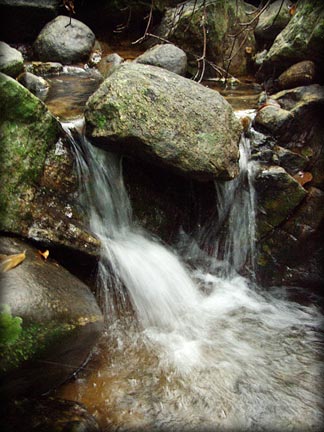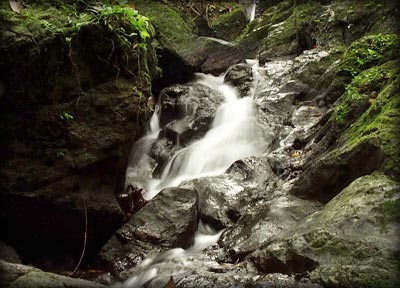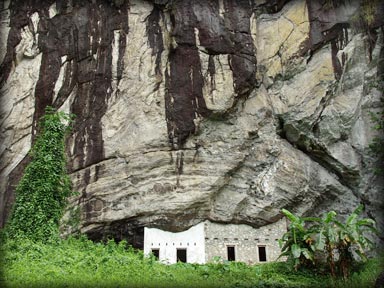 When
Batadombalena beckons When
Batadombalena beckons
An invigorating trek to the foothills of a majestic
mountain:
Story and pictures by Mahil Wijesinghe
The mountains beckon. Anyone who has witnessed the resplendence of
the Sinharaja rainforest would know the feeling. Just the thought of
laying eyes on that brilliant shade of green, found only outside the
confines of concrete jungles, raindrops falling unrestrained on your
body that strangely rejuvenates your being, and the sight of innumerable
small waterfalls, are enough to lure a connoisseur of nature out of his
or her comfort zone and send him or her charging into the wilderness.
Armed with Nikon camera and the requisite umbrellas, my two sons and
I set out to the Batadombalena Forest Reserve- a trekkers' heaven -
located six kilometers from Kuruwita on the Colombo-Ratnapura (A4) road.
The Batadombalena mountain range, 460m above sea level, was an intrinsic
part of pre-historic Sri Lanka. The massive cave found here has been
firmly established as a shelter of a pre-historic human habitation, with
archaeologists uncovering evidence of ancient stone tools and skeletal
remains inside the cave.
The pre-historic era is generally a lost territory for many of us.
But not so in Batadombalena, where the surrounding areas have been
declared an archaeological reserve, ensuring the environment has
remained unchanged for 30,000 years, or as close as it could get.
Contrasting reality
The dense foliage with its towering trees and the cool cascading
streams that dampen the air, provide a contrasting reality of silence
and sound, making one wonder if this is how it was in the early day. The
forest played an important role in guarding the per-historic cave, and
maintaining that sanctuary that is Batadombalena.
We started our trek from the village of Waladura, at the foot of the
hill. Life in this charming village, with around two hundred inhabitants
is not easy, with many of them eking out a living working in small tea
and rubber lands. A few villagers operate roadside boutiques that sell
beverages and snack items to visitors to the Batadombalena forest
reserve.
 The
path leading up to the summit winds through a small thicket leading to a
robust full-grown forest to rock patches without support railing and
finally to the historic Batadombalena cave. But the cave proper is still
some distance away, and in any case, there is too much happening around
us to think about anything else. The
path leading up to the summit winds through a small thicket leading to a
robust full-grown forest to rock patches without support railing and
finally to the historic Batadombalena cave. But the cave proper is still
some distance away, and in any case, there is too much happening around
us to think about anything else.
Small waterfalls
A strange buzz in the distance makes me stand and ponder. It is not a
sound city dwellers are familiar with, but standing still, taking in the
absolute calm of the surrounding I began to understand what the sound
was. It had rained heavily a few hours earlier and the sound comes from
the constant rumble of the numerous small waterfalls that dot the route,
acting like therapy for mind and body. It is only during the rainy
season that these wonders come alive, forming little streams that wind
through the trees and the creepers found all over the forest.
After trekking for about a half an hour, we reached a plateau of
sorts. Actually it is a valley. The rest of the journey is simple but
long. Climbing the rocky face, especially during the rainy days, can be
very risky, as the rocks get slippery and are hard to get a grip
on.After braving this patch and a couple of unintentional slips, mainly
due to our impatience, we finally reached the plateau, and were more
than well rewarded for our efforts. The view of the valley from this
point is simple and breathtaking.
Rich biodiversity
We couldn't even see the Waladura village in the middle of the vast
green ocean as the cool stream started its journey from the top of the
cave, swollen to its limits, and shimmered its way across the plains.
The summit of the Batadombalena Mountain stood in the distance,
looking down majestically at the forest that is home to a rich
biodiversity including, the rare endemic Vesak Orchid, which grows only
in tropical rainforests in the Sabaragamuwa province.
The one kilometer trek to the Batabombalena cave was quite pleasant.
The entire route was filled with dark green forest canopy infested with
leeches and mosquitoes. The cave, which had been a Buddhist hermitage at
one time, is now deserted. Some of the visitors to the place had marred
the walls with unbecoming scribbles. Fortunately, visitors are still
spars to this forest reserve, enabling it to retain its immaculate
condition. The pristine conditions also remind us of the need to
preserve and protect this oasis of beauty, so that the future generation
too bask in the glory what it means when history and nature complement
each other in a beautifully show of mountain and forest cover.
|

The various patterns of flora in the Batadombalena Forest
Reserve. |

|
|

